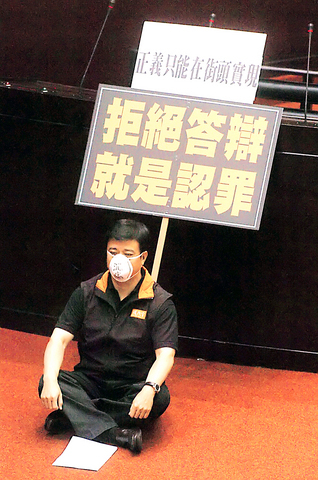Pan-blue-camp lawmakers and academics accused the government yesterday of doctoring financial reports and embezzling public assets, claiming the country is "almost broke" as a result of rampant corruption and mismanagement.
People First Party Legislator Liu Yi-ju (劉憶如) told a meeting for the legislature and government officials that the Democratic Progressive Party (DPP) government used six tricks to make false financial statements over the past six years.
He said it had exaggerated tax revenues, fabricated income from selling government-owned shares in state enterprises, wasted public money, doctored accounting items, made complicated reinvestments to evade legislative auditing and hid key information and then endorsed this behavior.

PHOTO: SEAN CHAO, TAIPEI TIMES
She quoted international rating agencies as claiming that Taiwan's financial rankings dropped to 79th in the world -- and that government debt was running at NT$11 trillion (US$337.5 billion) or 110 percent of GDP, as opposed to the government's claims of 39 percent.
President Chen Shui-bian (陳水扁) was not telling the truth when he said Taiwan could afford to borrow "twice as much" as it has, the lawmaker said.
The meeting was held to review an opposition-initiated motion to recall the president. DPP lawmakers and most government officials boycotted the meeting.
Chinese Nationalist Party (KMT) Legislator Joanna Lei (雷倩) said NT$4.61 trillion in public assets had been improperly removed through merging state-owned banks with private holding companies, BOT projects, privatization of state-owned businesses and "sheer waste" by government departments.
People First Party Legislator Liu Wen-hsiung (
The signs were a reference to the president's decision to bypass the legislature in rebutting opposition charges.
Yesterday's legislative committee meeting was second in a series of four before the legislature votes on the recall motion next Tuesday.

Taiwanese can file complaints with the Tourism Administration to report travel agencies if their activities caused termination of a person’s citizenship, Mainland Affairs Council Minister Chiu Chui-cheng (邱垂正) said yesterday, after a podcaster highlighted a case in which a person’s citizenship was canceled for receiving a single-use Chinese passport to enter Russia. The council is aware of incidents in which people who signed up through Chinese travel agencies for tours of Russia were told they could obtain Russian visas and fast-track border clearance, Chiu told reporters on the sidelines of an event in Taipei. However, the travel agencies actually applied

Japanese footwear brand Onitsuka Tiger today issued a public apology and said it has suspended an employee amid allegations that the staff member discriminated against a Vietnamese customer at its Taipei 101 store. Posting on the social media platform Threads yesterday, a user said that an employee at the store said that “those shoes are very expensive” when her friend, who is a migrant worker from Vietnam, asked for assistance. The employee then ignored her until she asked again, to which she replied: "We don't have a size 37." The post had amassed nearly 26,000 likes and 916 comments as of this

New measures aimed at making Taiwan more attractive to foreign professionals came into effect this month, the National Development Council said yesterday. Among the changes, international students at Taiwanese universities would be able to work in Taiwan without a work permit in the two years after they graduate, explainer materials provided by the council said. In addition, foreign nationals who graduated from one of the world’s top 200 universities within the past five years can also apply for a two-year open work permit. Previously, those graduates would have needed to apply for a work permit using point-based criteria or have a Taiwanese company

The Shilin District Prosecutors’ Office yesterday indicted two Taiwanese and issued a wanted notice for Pete Liu (劉作虎), founder of Shenzhen-based smartphone manufacturer OnePlus Technology Co (萬普拉斯科技), for allegedly contravening the Act Governing Relations Between the People of the Taiwan Area and the Mainland Area (臺灣地區與大陸地區人民關係條例) by poaching 70 engineers in Taiwan. Liu allegedly traveled to Taiwan at the end of 2014 and met with a Taiwanese man surnamed Lin (林) to discuss establishing a mobile software research and development (R&D) team in Taiwan, prosecutors said. Without approval from the government, Lin, following Liu’s instructions, recruited more than 70 software